The international DO-HEALTH study shows that a combination of vitamin D, omega-3 fatty acids and a simple home strength exercise program can significantly reduce the risk of invasive cancer.
As the most comprehensive study on aging in Europe, DO-HEALTH examines how improved health can promote the independence and quality of life of people over the age of 70 who are in general good health, as well as help to prevent cancer. In an interview, Heike A. Bischoff-Ferrari, the study’s coordinator, explains how the combined measures can reduce the risk of new invasive cancers in this age group within three years. Vitamin D, omega-3s and exercise each affect different mechanisms of cancer development. Vitamin D can curb the growth of cancer cells, while omega-3s have anti-inflammatory properties and exercise helps destroy cancer cells. Viewed in isolation, the benefits of each of these measures are limited. However, when the three measures are combined, they can reduce the risk of invasive cancer by 61 percent. These findings could prove decisive in shifting the future of cancer prevention toward a multi-component prevention strategy. They give rise to new prevention opportunities, from which other age groups could also benefit thanks to the measures’ high tolerability and availability.
The University of Zurich’s research program Precision Age also aims to use innovative methods to promote the health of older people, an age group whose numbers are increasing. Based on a biobank created as part of the DO-HEALTH study, the program explores further questions relating to aging, focusing on reducing the risks of age-related chronic diseases and slowing down biological aging processes.



![[Translate to English:] Portraitaufnahme von Jonas Birk.](/fileadmin/_processed_/c/7/csm_Jonas_Birk_Interview_7efc87a5cb.jpg)